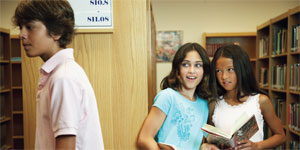Middle School
5 min Read
How to deal with your preteen’s first crush

February 18, 2016
Middle School
5 min Read

February 18, 2016


Darci Butler’s* son Anderson is smitten. The 12-year-old’s crush on a classmate has been going strong for more than two years. “His feelings for her have not waned at all,” says the Toronto mom of three boys. “Each time I ask about her, he blushes. I know he gives her gifts of his best artwork. He likes to do homework with her. Sometimes he’ll give me a bit of information, but not much. It’s sweet, really.”
Crush is a word that adults give to the special feelings that kids have for someone else, says Cory Silverberg, a Canadian sex educator and author of Sex is a Funny Word (Triangle Square). While some children will develop attachments as young as Grade 1, they often intensify at the onset of puberty (though some children may not experience one until high school). Common clues your child is love struck? “They think about this person, they talk about this person and they want to be with them. For some, it may involve wanting to hold hands, for others it may not involve any touching,” Cory explains. “All crushes are different. Some last a few days, some last years.” And, he adds, they can be confusing, wonderful and awkward all at the same time.
While learning about your son or daughter’s feelings for another person can be a sweet moment, it’s best to remember this is your child’s experience. “It’s not our crush,” says Julie Freedman Smith, a parenting coach with Calgary company Parenting Power. “What we can do is listen and acknowledge feelings,” she suggests. Your child might be quite content to admire their crush from afar, or, go out of her way to show her crush how she feels (remembering that actions likes teasing or texting constantly might make the other child uncomfortable). Either way, says Julie we should respect that choice. “What you can do is ask ‘It seems like you care for this person? Do you have a next step?’’ When we ask questions, it lets kids know we are here to talk about it, that we’re not going to push them in a direction they don’t want to go.”
Also be mindful of how you react to the news of a crush, Cory advises. “Save your ‘aww’s’ for after bedtime,” he says. “Some kids can feel the word ‘crush’ is limiting because we are defining it. Describing it as ‘cute’ can feel condescending to your child.”
If your child is debating whether to wear his (or her) heart on his sleeve, ask him if he’d like to brainstorm some ideas on what he might say, and talk about what might happen depending on how their crush responds. Then, if he needs or wants some help, you can guide him with some language, says Julie. You may want to share the story of your first crush if your child asks, says Cory.
As every adult knows, not every crush will be reciprocated. “Unfortunately, parents can’t take away our kids’ sad feelings if this happens, but we can empathize, saying “That’s too bad, buddy” or “I’m sorry it turned out that way,” says Julie, noting hugs are good too, if your child is open to receiving them. “This is all part of real life. Your child needs to learn that he or she can survive it.” Don’t try to minimize the event, adds Cory. Saying “You’ll get over it,” or “That kid isn’t good enough for you,” may seem like it’s helping, but it rarely does.
It’s how we respond to our kids questions and feelings about crushes at this age, that will build their trust in us, says Julie. “It really sets up whether our kids will feel comfortable talking about relationships in the future.”
*name has been changed by request
If someone has a crush on your child and he or she feels the same way, that can be wonderful. But if they don’t? Our experts have these tips:
Be kind
“Teach your child to be gentle,” says Cory Silverberg. Discovering that someone likes you can be an awkward situation and your child may be confused about how to respond – some may laugh or make a face. “This is about feelings and we can be gentle with each other’s feelings,” he says.
Be firm
A child can be kind while still setting boundaries. “We want to teach our kids to say ‘no’ and expect that ‘no’ is respected,” says Cory. “Using “I” can help with this,” says Julie Freedman Smith. “Such as, ‘I really like your friendship but that’s where I want it to stay.’ Or, ‘I enjoy being your friend but I don’t want it to go any further.’ When we use ‘I’ it’s about us. Not about them.”
Originally published in ParentsCanada magazine, February/March 2016.